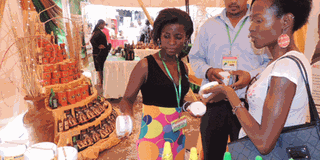Honey week on

Africa Agribusiness Academy (AAA) country Director Uganda Mr. Karama Farid (C) shows honey products to some of their customers during the recent Honey week Exhibition at Lugogo Forest Mall.
PHOTO BY JOSEPH KIGGUNDU
What you need to know:
In Uganda, it is estimated that about 1.5 million households derive their incomes from bee keeping from which they harvest various hive products such as honey, propolis and bee wax, among others
KAMPALA
Producers of honey in Uganda, among other regional countries are set to reap big, after Africa Agribusiness Academy (AAA) moved to start promoting their activities in East Africa.
According to the AAA’s country Director in Uganda, Mr. Farid Karama some of the activities to promote honey production will include articulating, sharing and developing professional practical knowledge about honey production, processing and trading.
The organization will also build and exploit partnerships among honey entrepreneurs and other relevant actors in the honey sector in the region and African continent as a whole.
“This will work for Africa by having our Honey products at the international market which will help to increase the region’s foreign exchange,” Mr Karama said.
He added that the organization has invited four of the five members of the East African community to take part in a community of practice.
“So far three countries (Uganda, Kenya and Tanzania) have confirmed and we’re now waiting for the Rwanda to confirm her participation,” added
The Association will be launched on Wednesday at the peak of the Honey week at Arch Apartments in Ntinda which will be followed by the official opening ceremony and exhibitions by President Yoweri Museveni at Kati Kati ground.
In Uganda, it is estimated that about 1.5 million households derive their incomes from bee keeping from which they harvest various hive products such as honey, propolis and bee wax, among others. The honey value chain is steadily growing with an estimated annual production of 680 metric tonnes per annum, according to the 2012 statistics from the Food and Agriculture Organisation (FAO) but this remains way below what experts believe is the country’s honey production potential.




